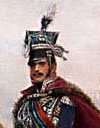 |
| Alexander I, Tsar of all the Russias |
Meantime the Tsar and his advisers were also hard at work reviewing their strategy. After being persuaded by his experts to abandon his Fabian strategy, Alexander visited Moscow on July 24 and made a public, emotional appeal for the assistance of every Russian citizen capable of bearing arms. His plea did not go unheeded; the principality of Moscow promised 80,000 militia as its contribution, and the other regions of Russia gave similar undertakings in proportion to their resources. he mood of Russian resistance was rapidly assuming the overtones of a religious crusade. The metropolitan Archbishop offered the Tsar the venerated Ion of St. Sergius, and Alexander entrusted it to the Moscow militia as their guerdon. The even more famous Black Virgin of Smolensk, which reputedly had miraculous curative properties, was also delivered into the care of the Russian army. The simple peasant soldiers of Muscovy were doubly inspired by this combining patriotic and religious appeal. They marched to battle chanting "'Tis the Will of God."
 |
| Kutuzov, Mikhail Larionovich Golenishcev-Kutuzov, Prince of Smolensk |
In association with this growing sense of mystical inspiration, and to some extent in answer to the growing clamor of the Russian nobility, Alexander decided to supersede Barclay de Tolly and place the aged veteran Kutusov in supreme command of the Russian forces. Opinion was adamant that the time for retreat was over; at least one all-out attempt should be made to defend Moscow from the invader, and no man appeared better qualified to lead the troops on such occasion of national crisis and dedication. The choice was not ideal in every way; in the words of von Clausewitz, "Kutuzov was approaching seventy years of age and no longer possessed either the activity of mind or body which one sometimes finds in soldiers of that age. However, he knew the Russians, and how to handle them ... He could flatter the self-esteem of both populace and army, and sought by proclamation and religious observances to work on the public mind." In many ways his military abilities were inferior to those of Barclay, but the fact that Kutusov was a native-born Russian while de Tolly was of alien extraction made him a more suitable choice in the hour of national need when all foreigners were suspect. In the words of de Segur, Kutusov's "valor was incontestable, but he was charged with regulating its vehemence according to his private interest; for he calculated everything. His genius was slow, vindictive, and above all, crafty --the true Tartar character! -- knowing the art of preparing an implacable war with a fawning, supple and patient policy." Prince Kutusov assumed his new responsibilities at Tsarevo on August 29, and at once set out to procure a defensive battle in a position of his own choosing.
~ D. Chandler, The Campaigns of Napoleon, p. 793-794























































No comments:
Post a Comment